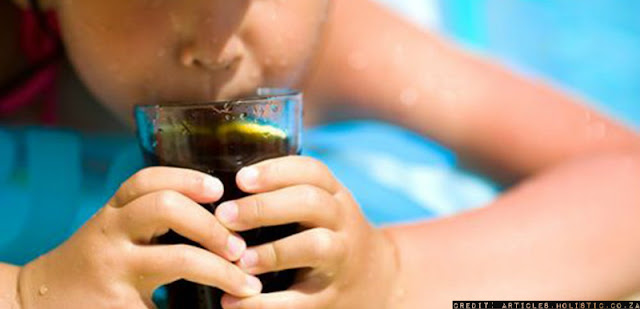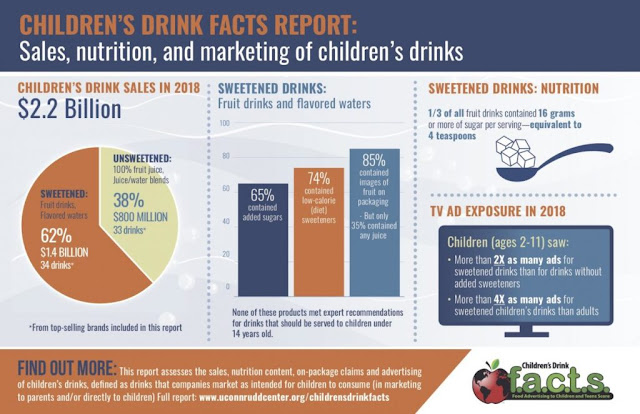Sweet Tooth: Two-Thirds of Drinks Sold to Children Are Sweetened
Sweet Tooth: Two-Thirds of Drinks Sold to Children Are Sweetened
An average half-liter bottle of soda contains the equivalent of 14 sugar cubes. While there is some variance between different sodas, virtually all sweetened drinks contain a high amount of sugar, and they rarely have any useful nutrients.
Sugary drinks are an important part of why childhood obesity has spiked in recent years, rising by over 1000% in the past 40 years. Researchers assessed the top-selling brands of children’s drinks to see just how healthy or unhealthy they are. A total of 34 sweetened drinks (fruit drinks, flavored waters, and rink mixers) and 33 unsweetened drinks (fruit juice, juice-water blends, and one sparkling water) were analyzed.
Sugary drinks are an important part of why childhood obesity has spiked in recent years, rising by over 1000% in the past 40 years. Researchers assessed the top-selling brands of children’s drinks to see just how healthy or unhealthy they are. A total of 34 sweetened drinks (fruit drinks, flavored waters, and rink mixers) and 33 unsweetened drinks (fruit juice, juice-water blends, and one sparkling water) were analyzed.
They found that 62% of the global sales of children’s drinks (a market worth $2.2 billion / year) comes in the form of sweetened, unhealthy drinks. In contrast, healthier drinks represented just 38% of all sales.
Furthermore, researchers report that companies spent $20.7 million to advertise children’s drinks with added sugars in 2018, primarily to kids under age 12 — contradicting the rhetoric used by many companies.
“Beverage companies have said they want to be part of the solution to childhood obesity, but they continue to market sugar-sweetened children’s drinks directly to young children on TV and through packages designed to get their attention in the store,” said Jennifer L. Harris, lead study author and the Rudd Center’s director of Marketing Initiatives. “Parents may be surprised to know that pediatricians, dentists, and other nutrition experts recommend against serving any of these drinks to children.
More and more companies are developing drinks that are allegedly healthier (particularly natural juices and juice-water blends that don’t contain sweeteners) — but these are still a minority, and recent research has shown that natural juices might not be a healthy option after all.
The biggest problem, however, is that parents are often duped by vague, misleading nutritional claims, as well as images of fruits on the packages of sugary drinks. Few parents bother to look carefully at the nutritional label, and they shouldn’t have to, researchers say. Instead, rules should be enforced so that labeling and packaging are accurate and clear, depicting which drinks contain sugar and which don’t.
More and more companies are developing drinks that are allegedly healthier (particularly natural juices and juice-water blends that don’t contain sweeteners) — but these are still a minority, and recent research has shown that natural juices might not be a healthy option after all.
The biggest problem, however, is that parents are often duped by vague, misleading nutritional claims, as well as images of fruits on the packages of sugary drinks. Few parents bother to look carefully at the nutritional label, and they shouldn’t have to, researchers say. Instead, rules should be enforced so that labeling and packaging are accurate and clear, depicting which drinks contain sugar and which don’t.
“You shouldn’t have to be a nutritionist to figure out whether or not a product is healthy for your child,” said Maria Romo-Palafox, study author and assistant professor of Nutrition and Dietetics at Saint Louis University.
“The fronts of the packages make children’s drinks look healthy, but there’s no way to know which ones have added sugars or low-calorie sweeteners reading the front. You have to read the nutrition facts panel on the back and you have to know the names of low-calorie sweeteners, such as acesulfame potassium and sucralose, to realize they are in the product,” she added.
The report, sponsored by the health charity Robert Wood Johnson Foundation, has not been peer-reviewed.
“The fronts of the packages make children’s drinks look healthy, but there’s no way to know which ones have added sugars or low-calorie sweeteners reading the front. You have to read the nutrition facts panel on the back and you have to know the names of low-calorie sweeteners, such as acesulfame potassium and sucralose, to realize they are in the product,” she added.
The report, sponsored by the health charity Robert Wood Johnson Foundation, has not been peer-reviewed.
Source: zmescience.com





Σχόλια
Δημοσίευση σχολίου